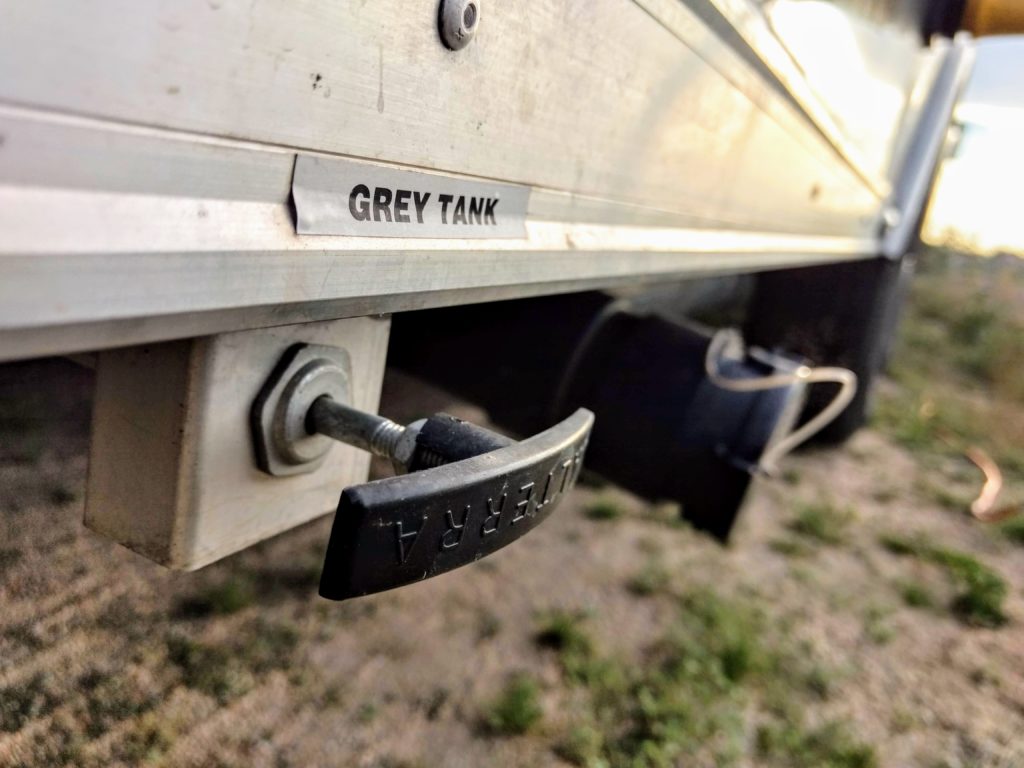The short answer is, “No” you cannot dump grey water anywhere. However, there are places where it is legal to dump grey water the ground, at least by Federal laws and regulations. State laws on grey water dumping, however, can be a different matter.

Can I Dump Grey Water Anywhere?
Part of the answer to this question, lies in what is defined as “grey water”. All six of the federal agencies that manage public recreation lands, address the dumping of grey water and black water. Only the BLM, however, makes an exception for “wash water”.
The BLM Rule on Dumping Wash Water
The BLM’s rule allowing campers to dump “wash water” on the ground, applies only on its open public lands, which are lands that the BLM has not designated for any other uses….
(b) On all public lands, no person shall, unless otherwise authorized: (3) Drain sewage or petroleum products or dump refuse or waste other than wash water from any trailer or other vehicle except in places or receptacles provided for that purpose;
§ 8365.1-1 Sanitation.
What Exactly is Wash Water?
The BLM does not define “wash water”. Hence, it is open to interpretation by both campers and BLM officers. It’s understood by most boondockers, however, to mean any water that was used for washing, which can be a lot of things, including showering, washing dishes, brushing teeth, scrubbing floors, etc.
There are some boondockers who argue that “wash water” must be captured in a tub or bucket in order to be eligible for dumping on the ground. That is, any water that entered a grey tank, or other sewage tank, is not permitted to be dumped on the ground. However, the BLM, on a nationwide level, has never made such a policy. This was started by a camper who took some advice from a BLM officer, and then spread the news around, and somehow it took hold.
Each BLM Field Office May Adopt Tougher Rules
The BLM allows each of its state offices and field offices to adopt additional rules that apply only to their jurisdictions. These rules are issued by the office director, and may be retracted at any time. The only way to know is to contact the specific field office where you plan to camp, and ask.
The Leave No Trace 200 Feet Set Back Rule
Leave No Trace Center for Outdoor Ethics is a private organization that stewards the “Leave No Trace” seven principles for ethical camping. Among them, are guidelines on dumping wash water. The guidelines do not address “grey tanks” nor any other holding tanks. However, it does mention that you should remain at least 200 feet away from other bodies of water (lake, river, pond, stream, etc.) when allowing wash water to pour on to the ground. Read more about this here.
All six federal agencies that manage public recreation lands have agreed to promote the “Leave No Trace” seven principles, but those principles have never been adopted as law or regulation.
Most States Require a Permit to Dump Grey Water
States don’t prohibit dumping grey water on the ground period, rather they prohibit dumping without a permit. This is evidenced by the millions of permits issued for septic tanks, which drain their water into the soil. If you happen to have a permit in hand for your RV at your location, you’re green-lighted to dump grey water. But, that’s unlikely for RVers. Otherwise, without a permit it’s illegal to dump grey water on the ground.
Some states, such as Arizona, allow homeowners to use captured grey water for irrigating lawns and gardens. Many RVers have mistaken this law to mean that all grey water can be dumped anywhere, which is not true. Read more about Arizona’s grey water dumping laws here.
State Laws Take Precedence Over Federal Recreation Lands
Five of the six federal agencies that manage public recreation lands, specifically permit state laws and regulations to apply on federal lands. Only the National Park Service maintains a policy of being independent of state laws.
Read More About Dumping Grey Water on the Ground
Read our other article, which takes a more in-depth look at the federal regulations on dumping gray water… “Can I Dump My Gray Water on the Ground?“


Can grey water run into a creek in the state of Kentucky
No. Kentucky considers both gray water and black water to be the same for the purposes of dumping sewage on the ground. Basically, you cannot do it anywhere in Kentucky, with the exception of places that have been approved by the Kentucky Department of Environmental Protection for dumping sewage.